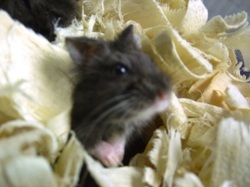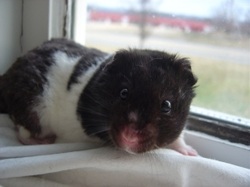| Judge's Park Small Animal Rescue |
|
Judge's Park Hamster Care

Luigi, a dwarf
Feeding:
-Hamsters must always have access to good quality Hamster food.
-Recommended brands are Kaytee and Mazuri
-The main ingredient should not be corn!!
-Only give them specially formulated Hamster food. It is better for their dietary needs.
- Avoid grocery store/large chain brands as these usually do not have the proper nutritional requirements for hamsters.
-Hamsters should have access to water at all times.
-Veggies and fruits are good additions to a Gerbil's diet (sweet foods only occasionally)
-Hamsters can have occasional snacks of people food, including breed, cooked meat, cheese, cereals, pasta, etc.
- Safe Hamster food
- Do not feed processed human food, chocolate, onions, garlic, and other very sweet/very fatty foods.
Housing:
-Hamsters should be in a large as possible metal or plastic bottomed, metal barred cage: the larger the better
-Multiple level cages are best as they love to climb
- Make sure the bar spacing is small enough so that they cannot get through and escape.
- Be careful with housing hamsters in cages with plastic bottoms or bars, as they could potentially chew through.
-If there is wire bottom shelving, try and cover it up with paper towels or newspaper so they don’t get foot problems
-Large Aquariums are another option as long as they have plenty of ventilation from the top (always make sure there is a grated top on the cage so there are no escapes!)
-Bedding should be Aspen or recycled paper (Carefresh, Yesterdays News).
-NEVER use Cedar, Pine, or any sort of cat litter (all poisonous)
-Make sure hamsters always have things to chew. They LOVE cardboard, wood blocks, and anything they can destroy. They are CHEWERS and must always have something to occupy their time.
Handling:
-Some hamsters do not enjoy being held, but they can be trained. If they nip, use gloves to handle them until they are used to you. Always scoop them up in your hands and if possible, put a cupped hand over them (Hamsters, especially dwarf hamsters, can jump and if they fall out of your hands it can seriously hurt them). The more handling the better to allow them to get used to humans.
Breeds:
-Hamsters come in mainly two "types":
- Dwarf hamsters are better for older children or adults as they can be nippy and excitable. They are very
entertaining pets to watch.
- Syrian hamsters are larger and better suited for children. They are calmer and can be more cuddly.
Medical Care:
-If a hamster should stop eating or become overly lethargic, please take them to a small animal savvy vet (see our vet section)
-Hamsters must always have access to good quality Hamster food.
-Recommended brands are Kaytee and Mazuri
-The main ingredient should not be corn!!
-Only give them specially formulated Hamster food. It is better for their dietary needs.
- Avoid grocery store/large chain brands as these usually do not have the proper nutritional requirements for hamsters.
-Hamsters should have access to water at all times.
-Veggies and fruits are good additions to a Gerbil's diet (sweet foods only occasionally)
-Hamsters can have occasional snacks of people food, including breed, cooked meat, cheese, cereals, pasta, etc.
- Safe Hamster food
- Do not feed processed human food, chocolate, onions, garlic, and other very sweet/very fatty foods.
Housing:
-Hamsters should be in a large as possible metal or plastic bottomed, metal barred cage: the larger the better
-Multiple level cages are best as they love to climb
- Make sure the bar spacing is small enough so that they cannot get through and escape.
- Be careful with housing hamsters in cages with plastic bottoms or bars, as they could potentially chew through.
-If there is wire bottom shelving, try and cover it up with paper towels or newspaper so they don’t get foot problems
-Large Aquariums are another option as long as they have plenty of ventilation from the top (always make sure there is a grated top on the cage so there are no escapes!)
-Bedding should be Aspen or recycled paper (Carefresh, Yesterdays News).
-NEVER use Cedar, Pine, or any sort of cat litter (all poisonous)
-Make sure hamsters always have things to chew. They LOVE cardboard, wood blocks, and anything they can destroy. They are CHEWERS and must always have something to occupy their time.
Handling:
-Some hamsters do not enjoy being held, but they can be trained. If they nip, use gloves to handle them until they are used to you. Always scoop them up in your hands and if possible, put a cupped hand over them (Hamsters, especially dwarf hamsters, can jump and if they fall out of your hands it can seriously hurt them). The more handling the better to allow them to get used to humans.
Breeds:
-Hamsters come in mainly two "types":
- Dwarf hamsters are better for older children or adults as they can be nippy and excitable. They are very
entertaining pets to watch.
- Syrian hamsters are larger and better suited for children. They are calmer and can be more cuddly.
Medical Care:
-If a hamster should stop eating or become overly lethargic, please take them to a small animal savvy vet (see our vet section)
